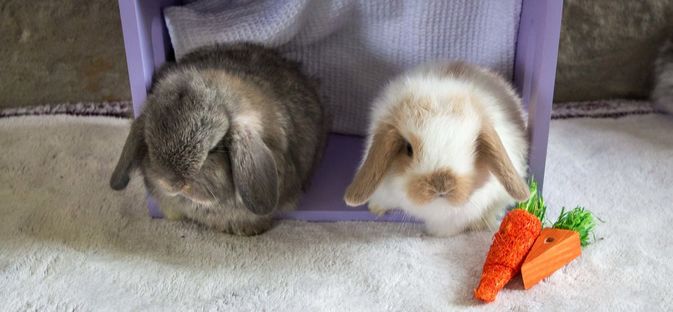Should I Spay or Neuter my Bunny?10/17/2018 In a nutshell, yes. While the risks that come with any rabbit surgery are very real, the numerous benefits of spaying and neutering bunnies are even more immense and worth considering before making any decisions. Benefits of Spaying/Neutering Rabbits *Hormonally-induced behaviors subside or disappear. Some of the nasty behaviors that develop when the bunny matures and the hormones surge include spraying, excessive digging and pawing EVERYTHING, grumpiness (usually in does), mounting your feet or anything that even remotely resembles another bunny or looks like fun to mount, and an overall reduced desire to be a cute, snuggly bunny. *Enhanced litter training. While unaltered rabbits can be litter trained, the best you can usually hope for is most of the urine and some of the poop to be in the litter box. Bunnies can't lick their cage and call dibs, so they scatter their urine and poo balls about as if to say, "Mine!" Most of my customers say that this dramatically improves upon spaying/neutering, though it may take a couple months for the hormones to subside. *Calms your bunny down. Remember how playful, care-free, and snuggly your bunny was as a baby? It's difficult for that personality to resurface with raging teenage hormones present. Spaying/neutering helps most bunnies to become more mellow and less occupied with finding themselves a hot chick or stud muffin. *Reduces risks of certain reproductive cancers. Though conflicting evidence can be found, general consensus (and most veterinarians will tell you) is that spaying in particular helps to reduce the likelihood of reproductive cancer in rabbits. *Easier bonding with another bunny. If you belong to the camp that believes a single bunny cannot be happy, then you'll definitely want to spay/neuter the bunnies that you wish to bond. Otherwise, two males will viciously fight, females will often fight unless sisters from the same litter, and male/female pairs will give you more bunnies. I always recommend spaying/neutering one bunny, letting the hormones subside for a couple months, and THEN seeking a second bunny. If the second bunny is a baby, immediate bonding may be possible, but spaying/neutering will usually be necessary once the baby is 5/6 months of age and hormonal. An older bunny can be immediately spayed/neutered and then bonding attempted slowly once the hormones dwindle. It's always a good idea to have two separate enclosures in case bonding never is successful, but the issue of hormones is usually the Achille's heel. *Prevents unplanned and unwanted pregnancies. If I had a dollar for every email I received from a panicked bunny owner about accidentally letting an unaltered male and female bunny play "for just a minute" and then having baby bunnies to care for (and find homes for!), I could probably buy a vacation home in Tahiti and be typing this while lounging on a white sand beach and being served sparkling beverages by my personal cabana bunny. You know the saying, "wham, bam, thank you ma'am"? It truly happens that fast in the bunny world (like 10 seconds or less), and with certain rabbit breeds, they indeed breed like rabbits with babies o'plenty. Let me debunk a common myth about rabbits: they don't have ovulation cycles and can become pregnant at almost any time, even if they are caring for young babies. Another myth is that it is safe to keep the buck (father) with the doe (mother) and babies. Not only will he impregnate her again, but he will likely kill the babies. It's simple. If you have a male and female bunny, either get one or both spayed/neutered or keep them completely separated in SECURE enclosures, and don't let them play in the same areas, ever. EVER! The only exception is if you purchase two babies at once and are told that they are the same gender. Disclosure: even experienced breeders can get the gender incorrect on an 8-week-old bunny. Bucks with split penises look like little does until they are 3-4 months, which is why I always recommend getting one bunny at a time and only adding a second bunny after the first is spayed or neutered. "How fast do bunnies really breed?" you are wondering. Let Molly and Sunny Jim (orange buck) show you. Molly played hard to get for a bit and then quickly submitted to Sunny Jim, and he successfully mounted and rolled off of her in under ten seconds. That's all it takes, folks, and then you could have up to 6-8 babies to find homes for in three months when they're ready to be weaned. (Rabbit gestation is about 30 days.) Risks of Spaying or Neutering a Rabbit *Anesthesia & Complications From what veterinarians have told me, it's not the actual spaying or neutering of a rabbit that is the most dangerous aspect of the surgery but the actual anesthesia and administering it to a fragile creature such as a rabbit. Remember that rabbits are prey animals whose systems are easily stressed and thrown off-balance. It is therefore vital to seek a veterinarian who is experienced at bunny spays and neuters (such as an exotic veterinarian), not a general vet who has few procedures on rabbits under his/her belt. Make sure that your vet does pre-surgery testing to help determine the health of the rabbit and administers pain medication post-surgery for recovery. *Cessation of Eating Post-Surgery If you've researching about rabbit health, you probably have come across the term GI Stasis. This basically means that the gastrointestinal system has slowed down or stopped due to a variety of factors, including stress, dehydration, illness, blockage, poor fermentation in the gut, and PAIN. That's right, just like in the wild, a rabbit in pain won't whimper like a dog but will instead hunker down in a meatloaf position, grinding his/her teeth in pain and suffering all the while. He/she will stop eating, drinking, peeing, and pooping. This is why pain medicine is essential after surgery, especially with spaying since it's more invasive than neutering. You may also have to syringe-feed your bunny to ensure proper hydration and intake of powdered food such as Critical Care or Sherwood's SARx Recovery food. A quiet, stress-free place to recover is also important, and you may wish to make sure someone is with the bunny during the day for at least the first couple days after the procedure. Final Thoughts on Rabbit Spaying & Neutering While surgery has its risks, if you desire your bunny to be housed indoors and have some degree of cohesion with your family, then spaying and/or neutering is extremely beneficial in the long run. Finding an experienced veterinarian with good references is key, though such a high level of care could set you back upwards of $400+. However, compare this to the cost of a new iPhone ($800+) that you only keep a few years. Bunnies can live 8-10 years, will provide an abundance of joy and pleasure to your pet-loving family, and they can't accidentally butt-dial your ex-boyfriend or scam you with a bogus free Disney vacation offer.
|
♥ Welcome! ♥ Hook's Hollands is a small hobby rabbitry on our Ohio farm and is operated by me (Diane) with the help of my family. All of my bunnies are pampered pets whom I adore. This blog serves to spotlight various bunny care topics and share a bit about my 365-days-a-year-with-no-vacations experiences raising bunnies. Categories
All
Archives
February 2021
|




 RSS Feed
RSS Feed


